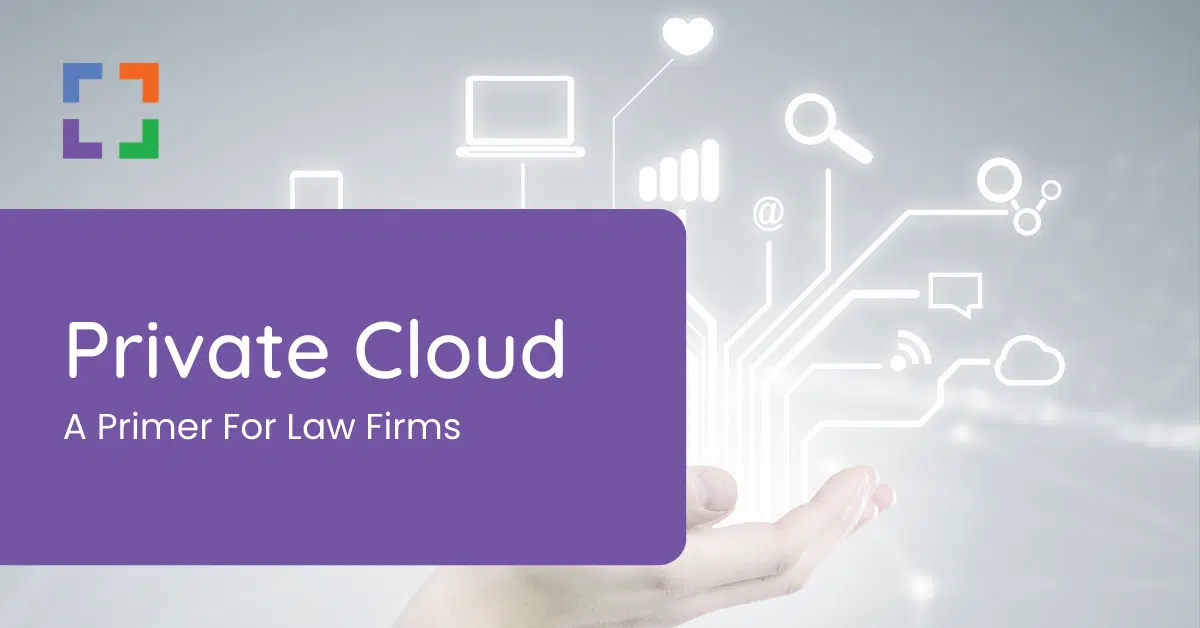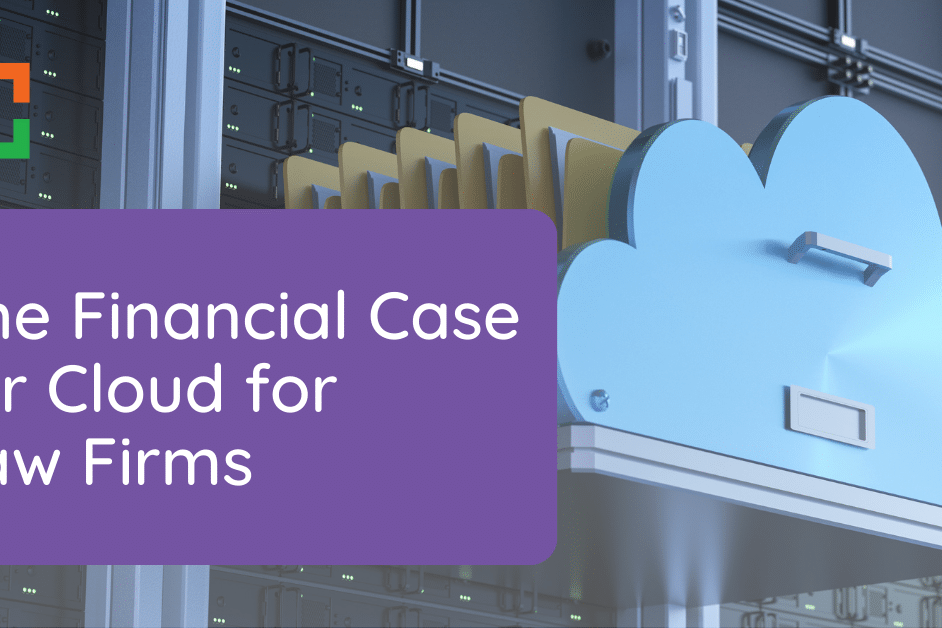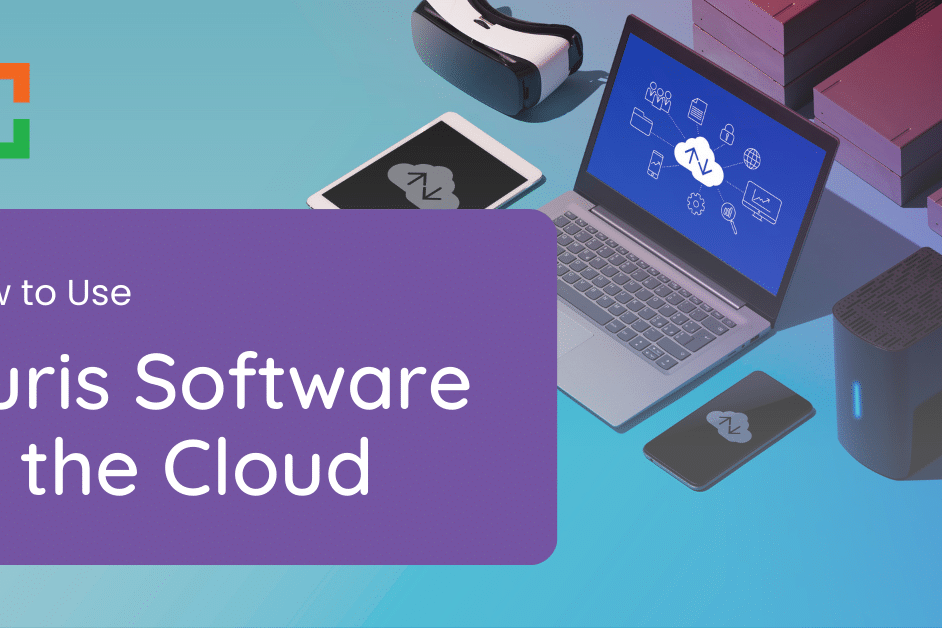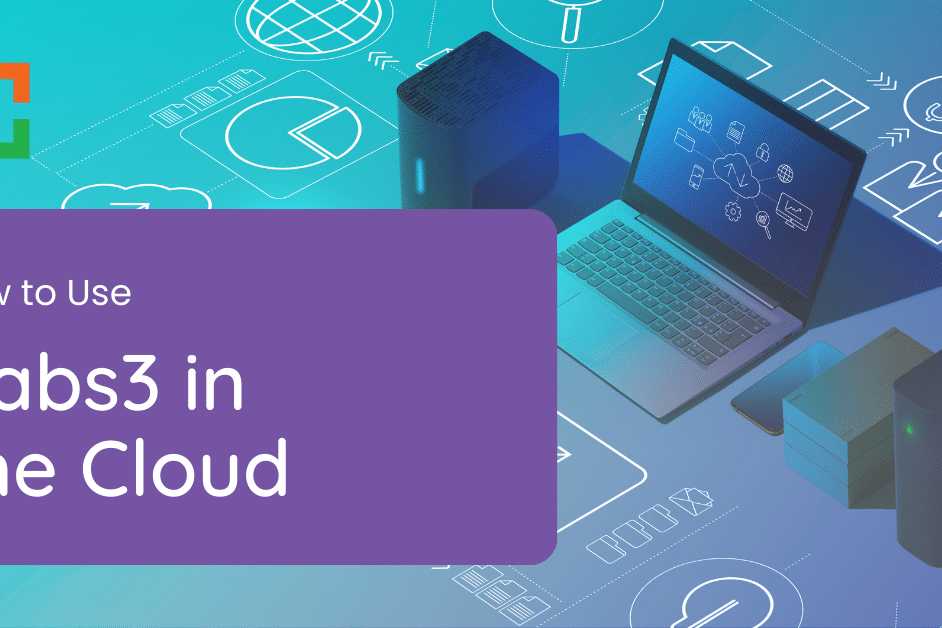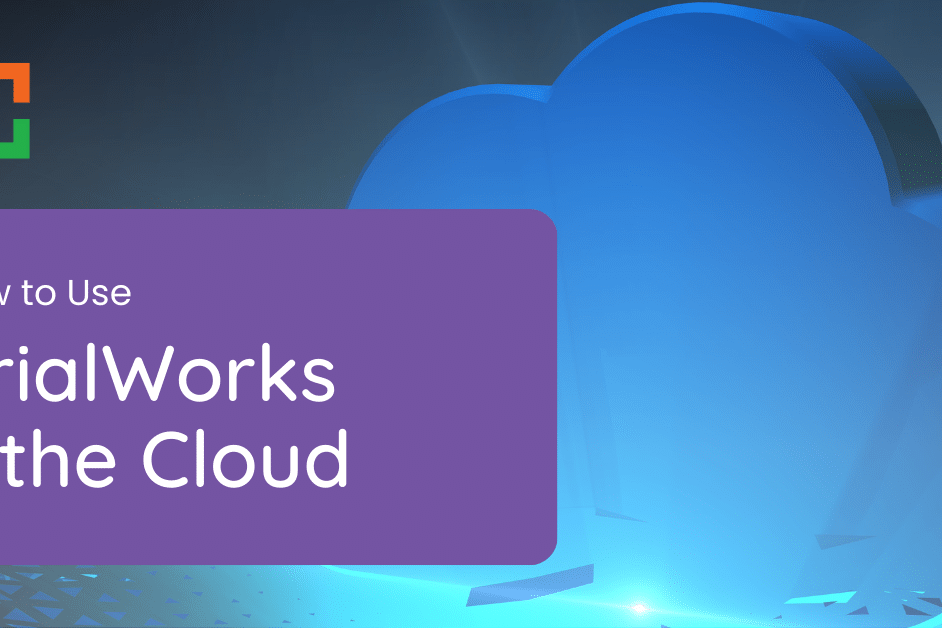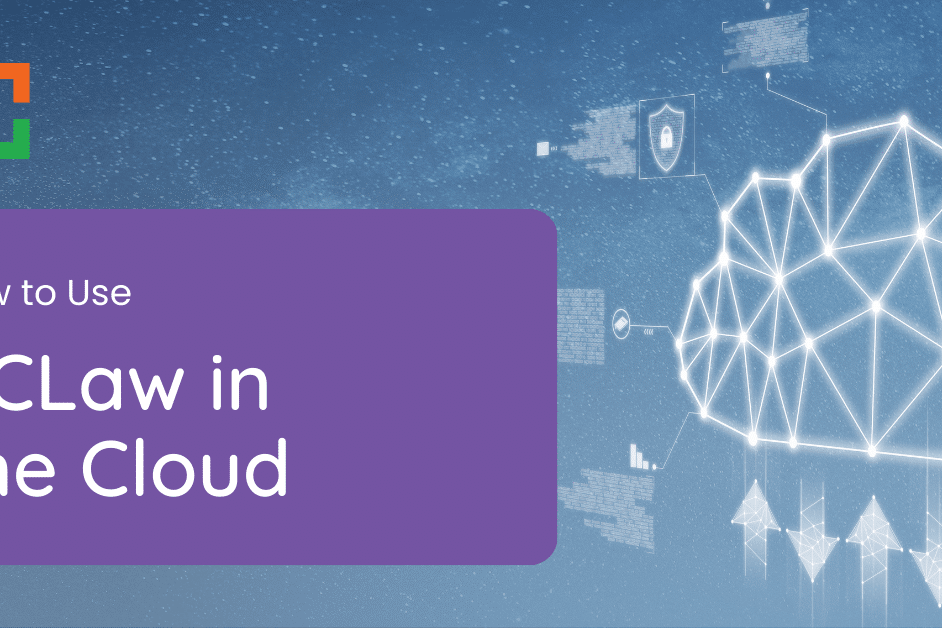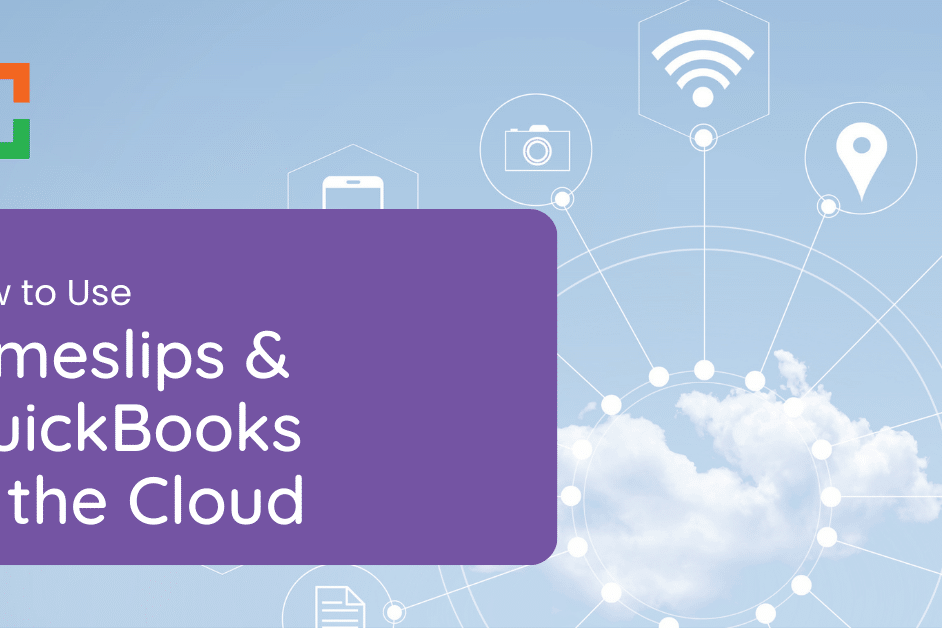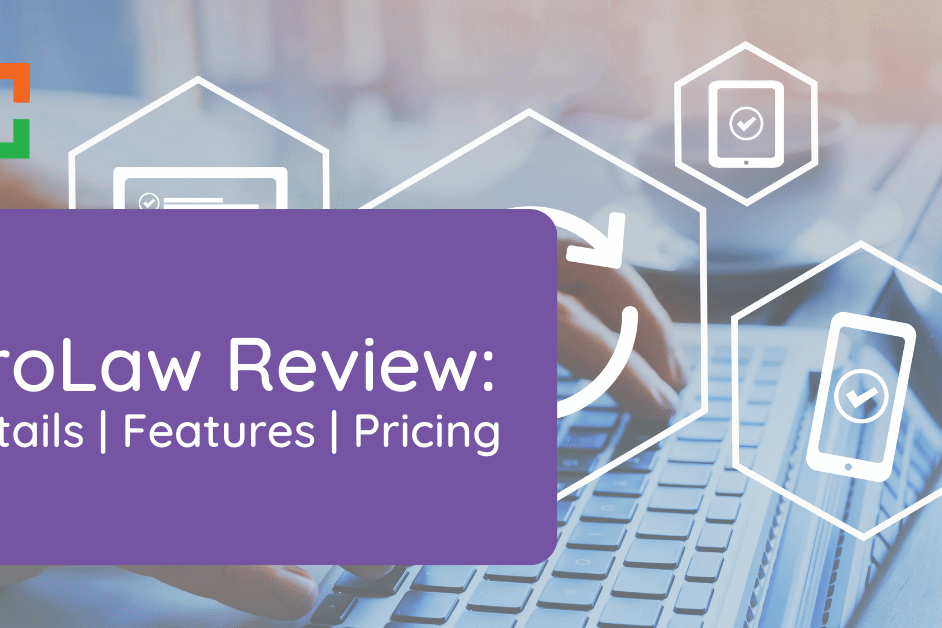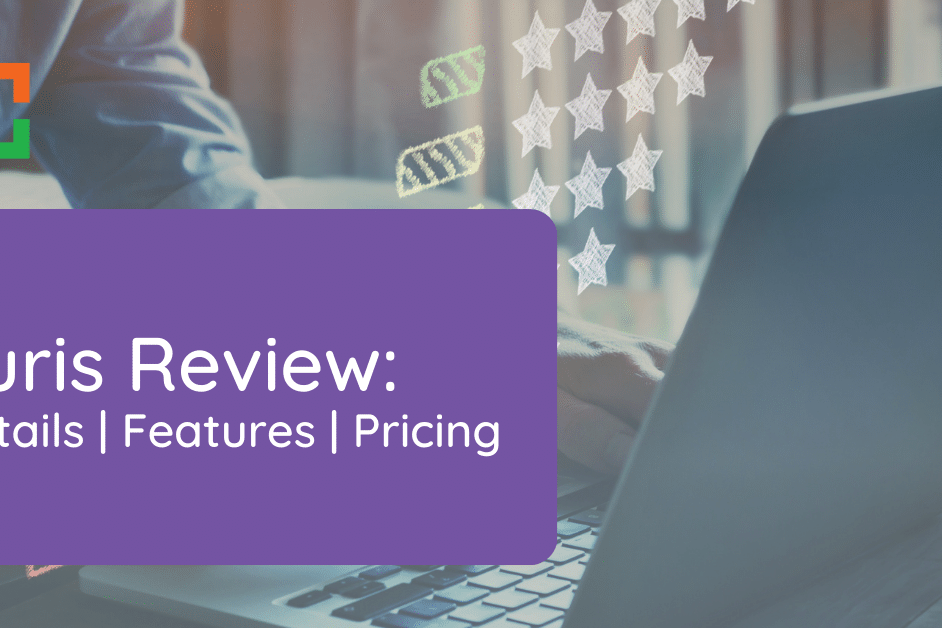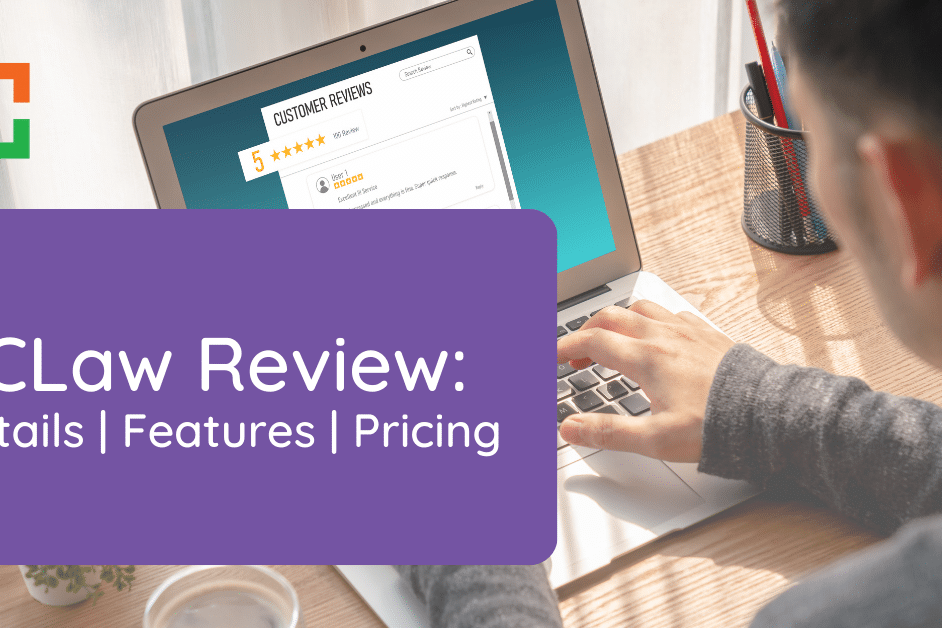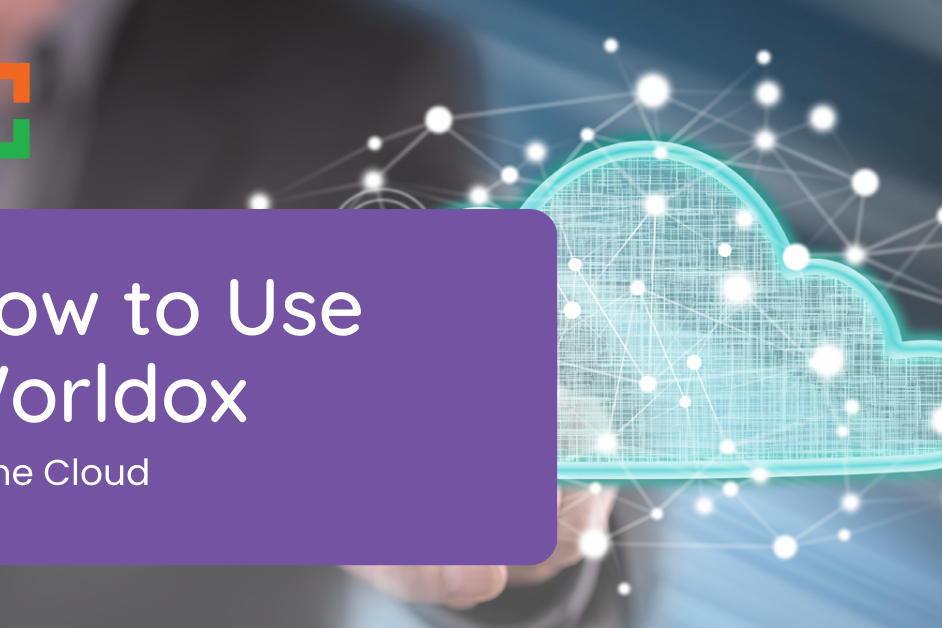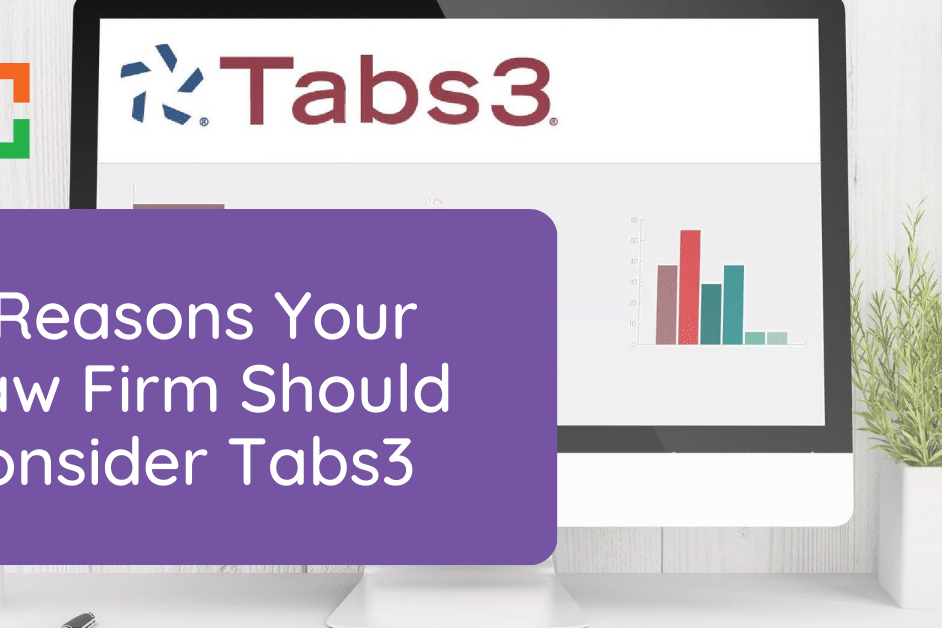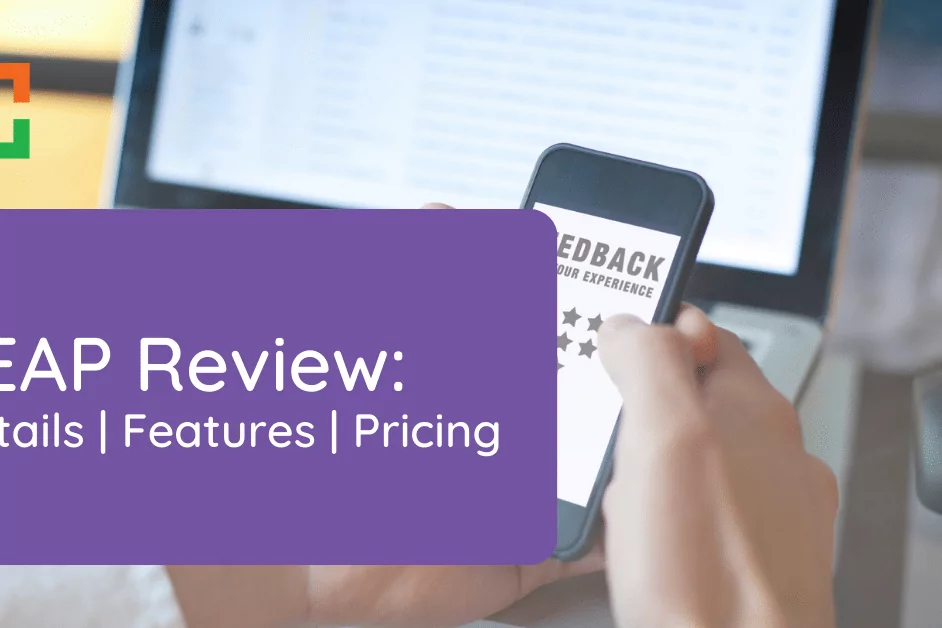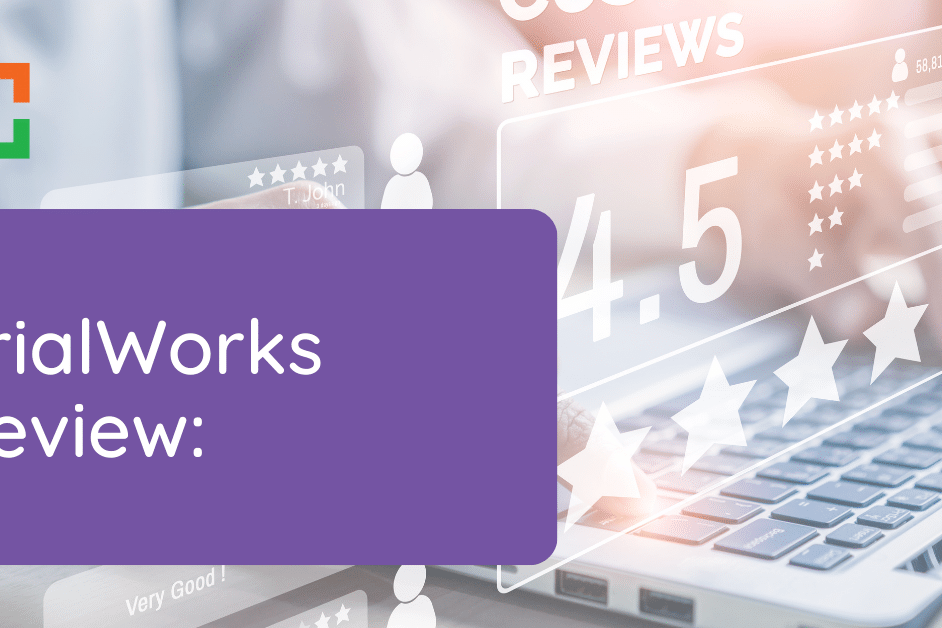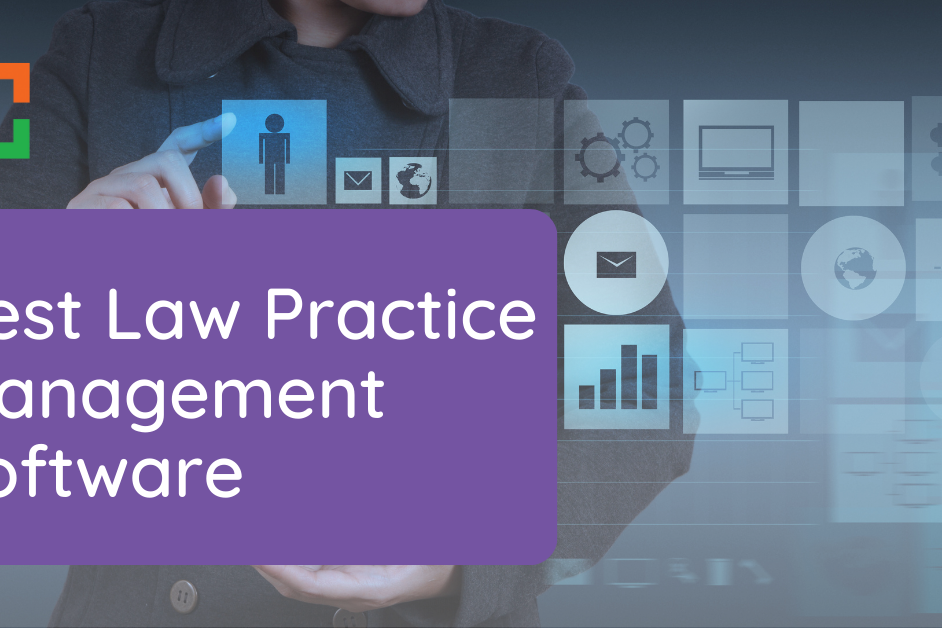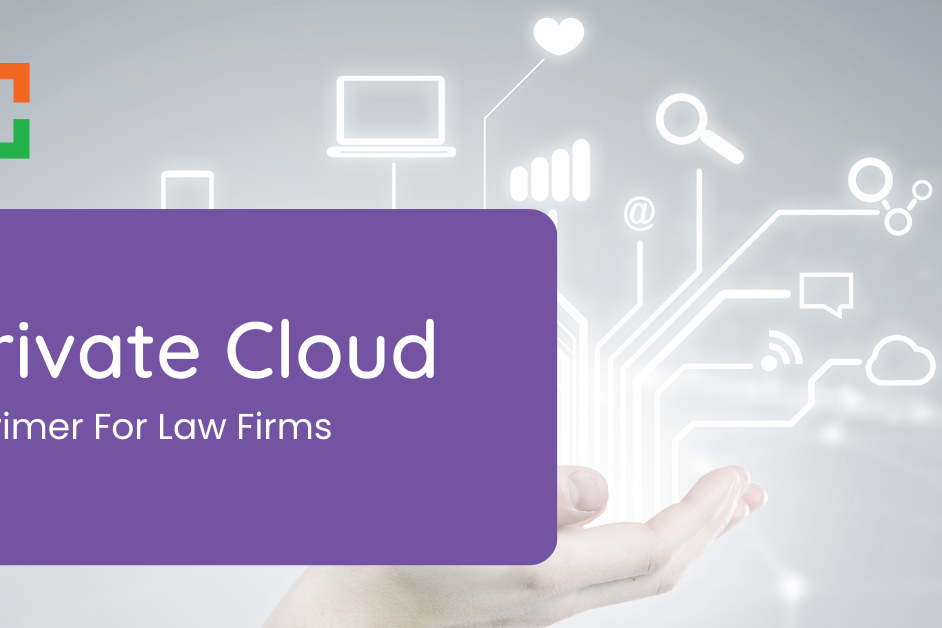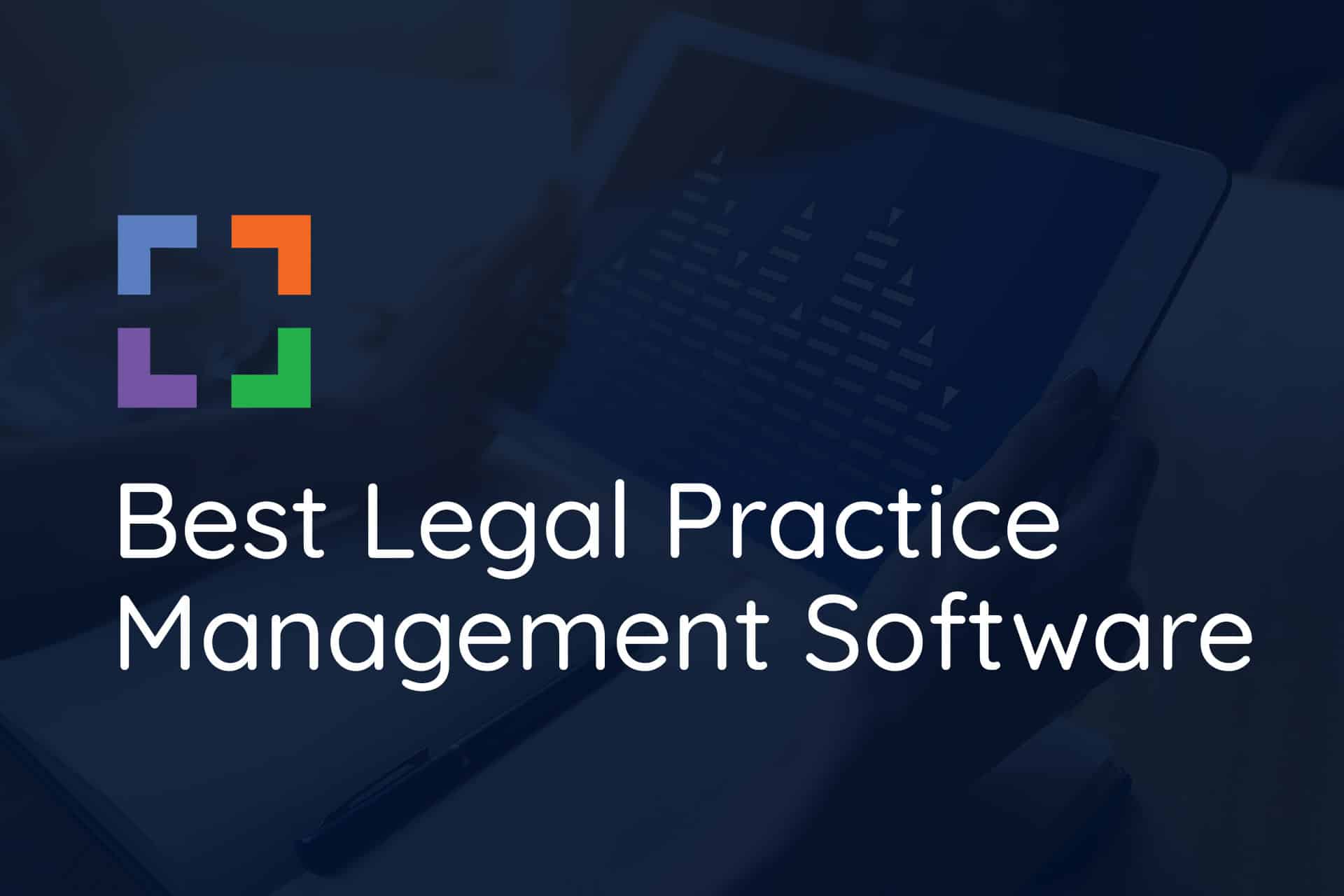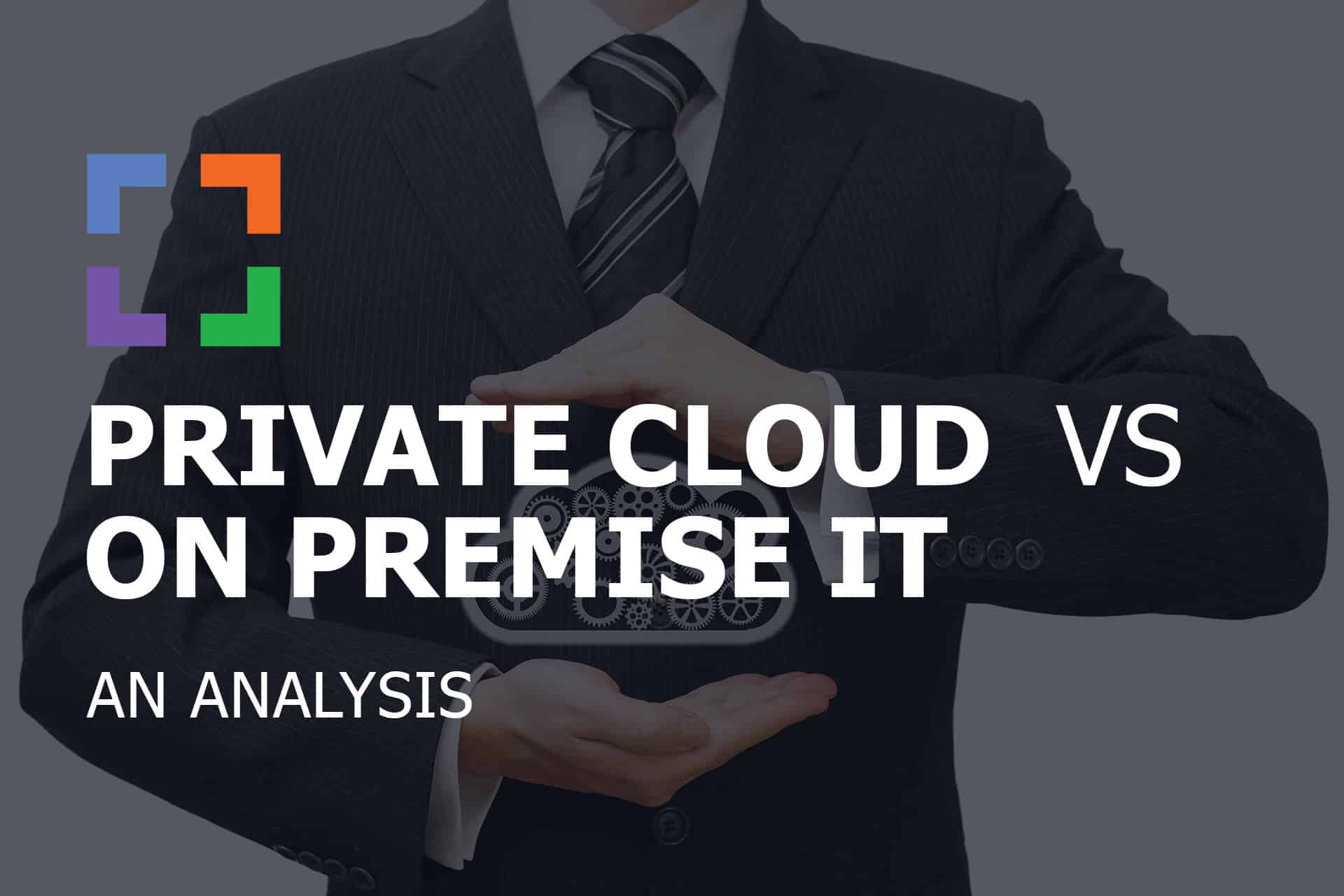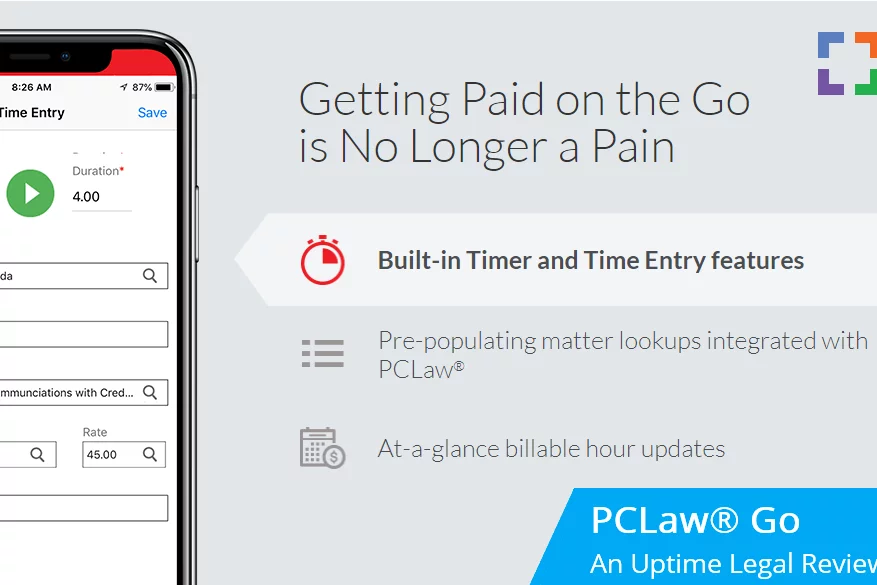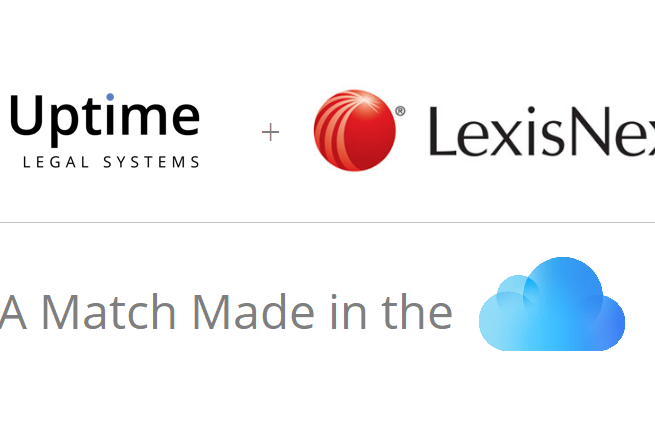Azure for Law Firms: A Complete 101
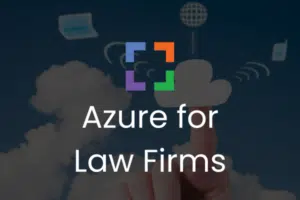
Hopefully you and your firm have considered cloud-hosting options to some degree.
However, whether you’re new to the cloud or you’re part of the law firms that grapple with the decision of transitioning to the cloud, the choices can be overwhelming.
This article delves into the intricacies of evaluating Azure, guiding law firms through the benefits, challenges, key considerations, and alternative, ensuring an informed decision in their cloud journey.
Microsoft’s Azure stands as a significant player in the cloud domain, offering a myriad of services. But is it the right fit for law firms? With specialized cloud solutions tailored for legal professionals, we see compelling alternatives arise.
In This Article
- Introduction to Azure for Law Firms
- Overview of Azure's Services
- How to Use Azure for Law Firms
- Benefits of Using Azure for Law Firms
- Drawbacks of Using Azure for Law Firms
- Alternatives to Azure — Comparing Cloud-Hosting Solutions
- Argument for a Private Cloud
- Next Steps for Your Cloud-Hosting
- Frequently Asked Questions - Azure for Law Firms
Introduction to Azure for Law Firms
In the realm of cloud computing, Microsoft’s Azure stands as one of the notable platforms that have made a mark in the industry. But what is Azure, and what relevance does it hold for law firms?
Azure is Microsoft’s cloud platform, designed to offer a suite of integrated cloud services. It encompasses a range of services that cater to various IT needs, from application development to data storage and management.
Essentially, Azure provides a framework where businesses, including law firms, can operate applications, store data, and even conceptualize new digital tools.
For law firms, understanding Azure is crucial not necessarily because it’s the definitive solution for their needs, but because it represents the broader shift towards digital transformation in the legal industry.
Law firms, historically reliant on paper and traditional methods, are now facing the challenges and opportunities of the digital age. With increasing data volumes, the globalization of legal services, and the need for efficient collaboration, cloud solutions are becoming more relevant.

We’ll look at the benefits.
Cloud-hosting solutions allow certain benefits, like scalability. This means law firms can adjust their IT resources based on their requirements. This scalability can be beneficial for firms that see fluctuating caseloads or have varying data storage needs.
As you evaluate your options for the cloud, it’s important to weigh your concerns against the offerings.
For example, security is a significant concern in the legal sector due to the sensitive nature of the data involved. Azure, like other cloud platforms, has mechanisms in place to address security concerns. However, it’s essential for law firms to conduct thorough due diligence to understand these measures and determine if they align with their specific security requirements.
Nonetheless, you’ll likely find that the cloud is the right move for you.
The move towards digital platforms like Azure signifies a more agile approach for law firms. The potential for remote access, for instance, can be beneficial in today’s increasingly mobile professional world. However, it’s also crucial to understand the challenges and nuances of such a shift.
Evaluate your choices.
While Azure offers a glimpse into the possibilities of cloud computing for the legal sector, it’s just one of many options available. As we explore further, we’ll delve into the specifics of what Azure brings to the table and how it compares to specialized solutions like Uptime Practice, allowing law firms to make informed decisions about their cloud-hosting needs.
Move Your Legal Software to the Cloud
With Uptime Practice
- Cloudify Your Legal Software
- Expert Legal Software Hosting/Support
- Cloud Storage for Documents + Data
- End-to-End Security
- Office 365 + IT Support (Optional)
Overview of Azure's Services
Virtual Machines (VMs)
Virtual Machines are the backbone of Azure’s infrastructure services. They allow users to run virtualized Windows or Linux servers in the cloud.
Law Firm Application
Law firms can utilize VMs to host their legal management software, databases, and other critical applications. For instance, a firm might run a VM to host a case management system, ensuring it’s accessible from anywhere without the need for physical hardware on-premises.

Active Directory
Azure Active Directory is a cloud-based identity and access management service. It provides secure user authentication and single sign-on (SSO) across applications.
Law Firm Application
Law firms can use Active Directory to manage access to sensitive client data and internal documents. For example, a firm might set up different access levels for partners, associates, and interns, ensuring that each group can only access the information relevant to their role.
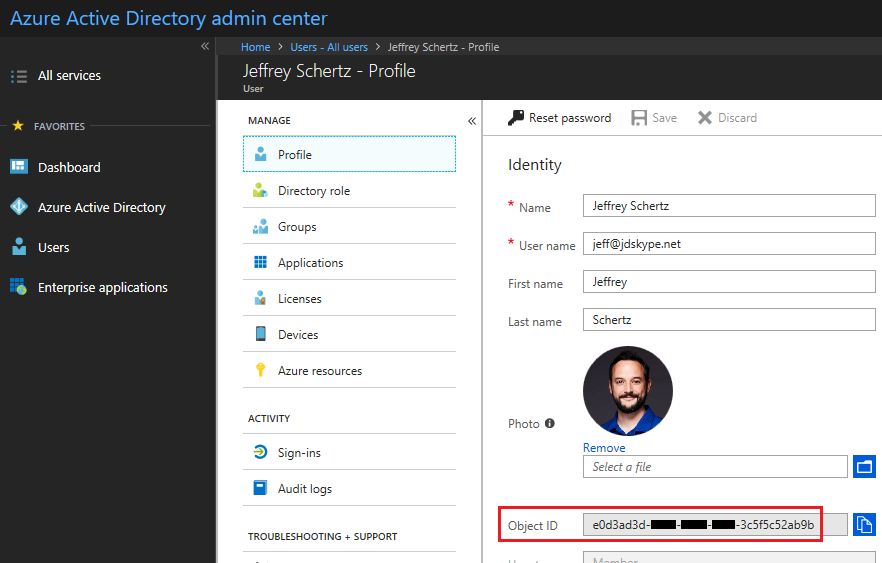
Azure Blob Storage
This is Azure’s object storage solution for unstructured data. It’s designed to store vast amounts of data like documents, images, and videos.
Law Firm Application
Law firms can utilize Blob Storage to archive case files, evidence photos, audio recordings of witness testimonies, and more. This ensures that all case-related materials are stored securely and can be retrieved swiftly when needed.
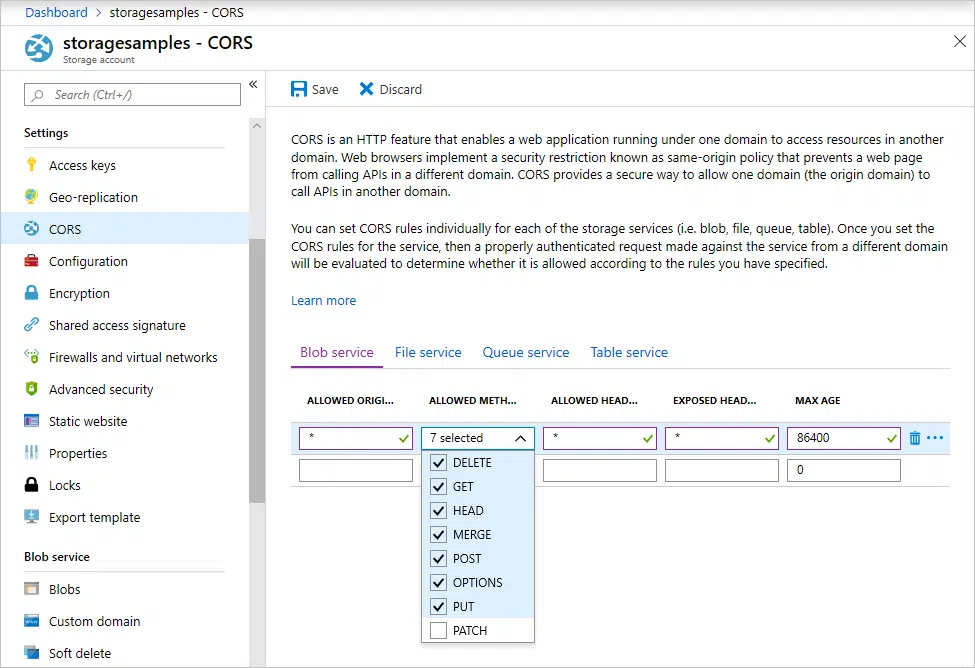
Azure SQL Database
A managed relational database service based on SQL Server, it offers high availability, security, and compatibility.
Law Firm Application
Law firms can use Azure SQL Database to manage client information, case histories, billing details, and more. For instance, a firm might have a database of all past and present clients, ensuring quick retrieval of client histories when taking on new cases.
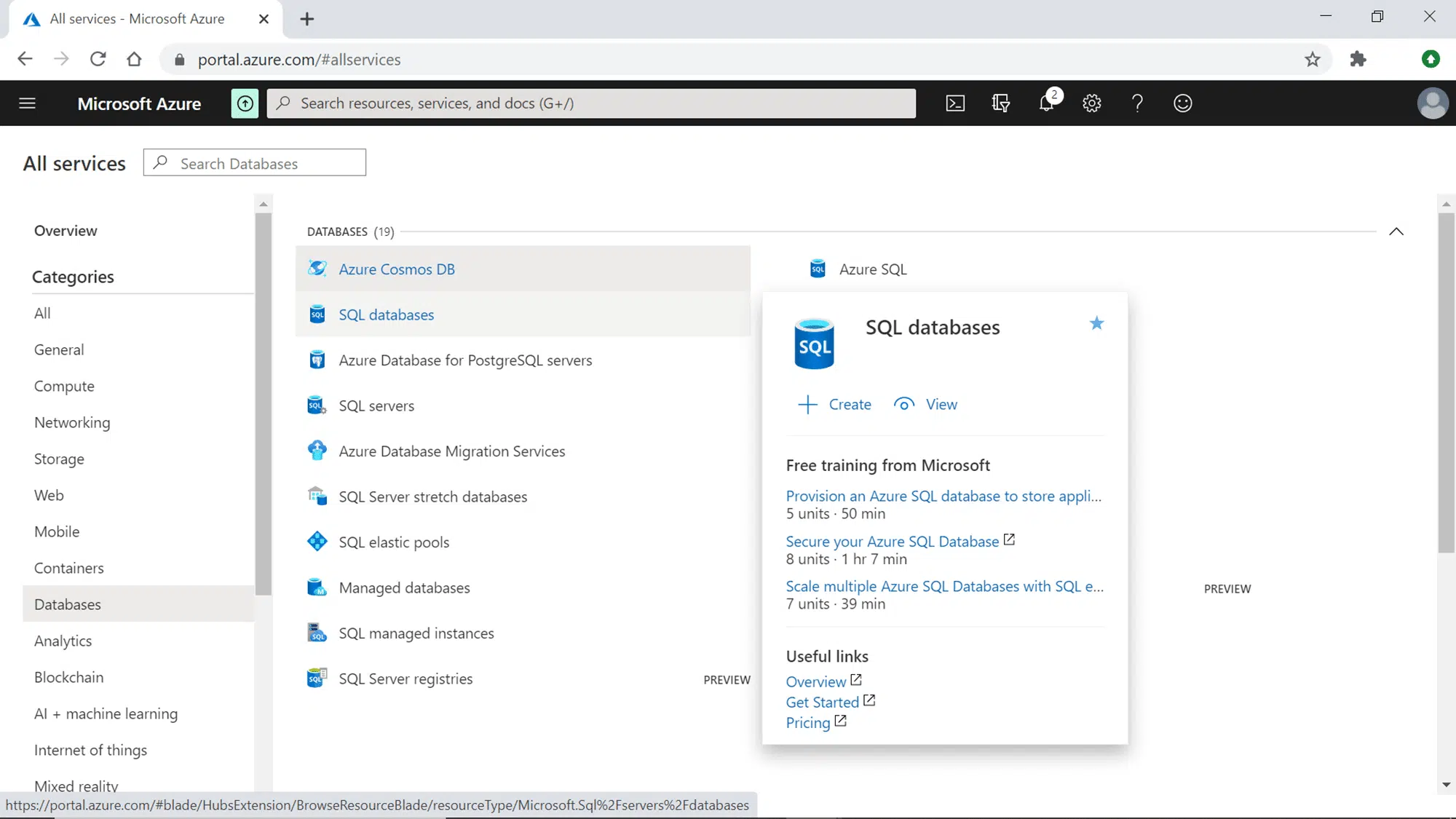
Azure Kubernetes Service
AKS is a managed Kubernetes container orchestration service. It simplifies the deployment, management, and scaling of containerized applications using Kubernetes.
Law Firm Application
While AKS might seem more suited for tech-centric businesses, innovative law firms developing custom applications can use AKS to manage and scale these applications. For example, a firm might develop a client portal where clients can check the status of their cases; AKS can help manage the backend of such a portal.
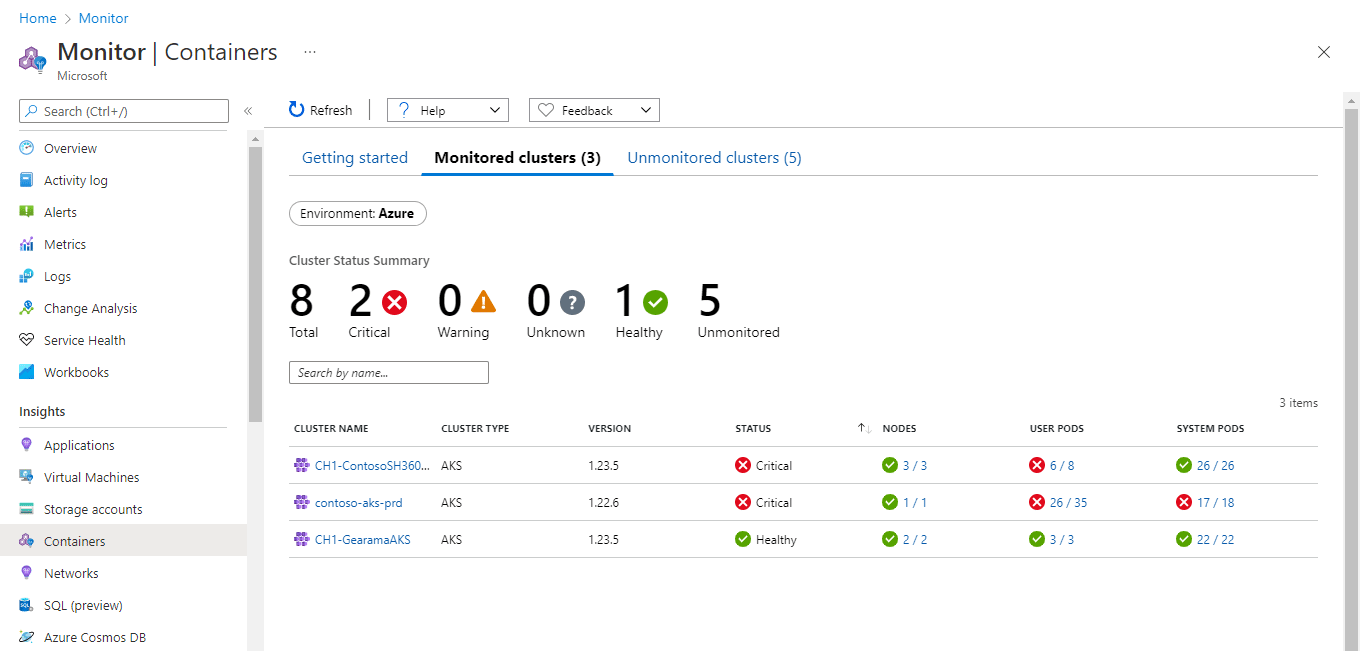
Azure Backup and Site Recovery
Azure Backup provides data backup in the cloud, while Site Recovery ensures business continuity by keeping apps running during outages.
Law Firm Application
Given the critical nature of legal data, law firms can use Azure Backup to regularly back up case files, ensuring no data loss. Site Recovery can be pivotal during unexpected events, like natural disasters, ensuring that the firm’s operations aren’t disrupted.
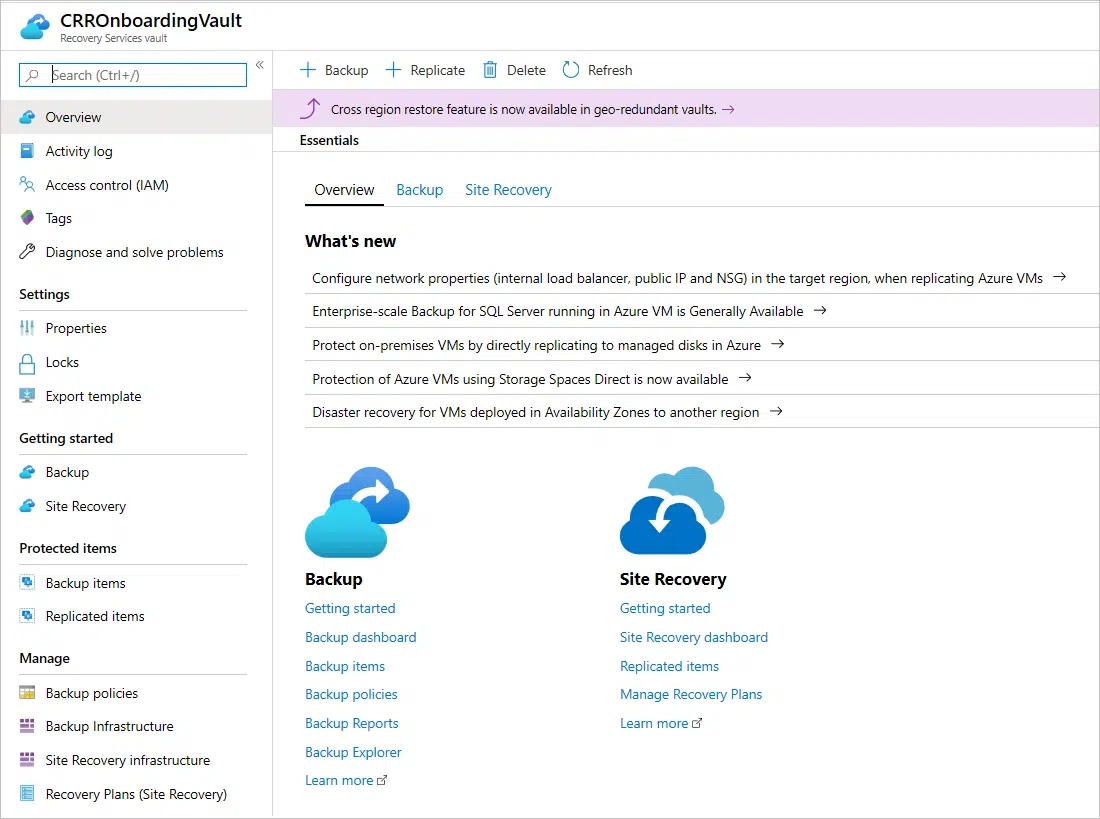
Azure Security Center
A unified security management system, it provides advanced threat protection across all Azure services.
Law Firm Application
Security is paramount for law firms. Azure Security Center can help firms monitor their cloud resources, detect potential threats, and ensure compliance with industry regulations.
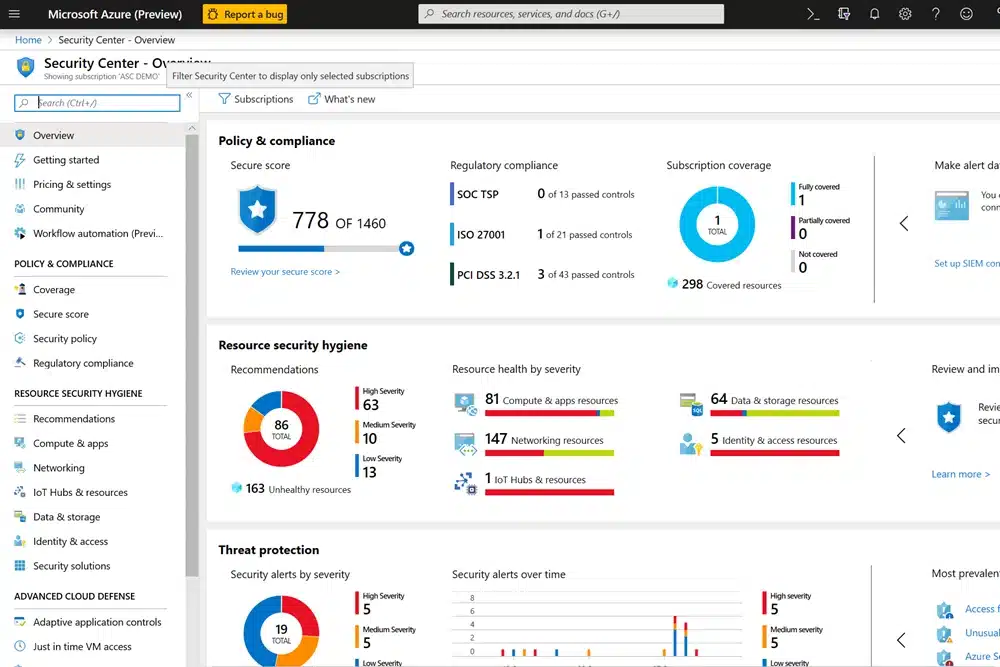
In summary, while Azure offers a vast array of features, its utility for law firms lies in how these features are leveraged.
From data storage to application hosting and security, Azure provides the tools. However, it’s up to the law firms to mold these tools to fit their unique needs.

Uptime Practice was a true miracle when the pandemic struck. We moved to Uptime Practice and were working immediately.
Todd Tracy – The Tracy Law Group, PLLC
How to Use Azure for Law Firms
Azure’s expansive suite of services presents a plethora of opportunities for law firms to modernize and optimize their operations.
Beyond the foundational features, there are strategic ways law firms can harness Azure’s potential to drive efficiency, collaboration, and innovation.
Data Analytics with Azure Synapse Analytics
Azure Synapse Analytics is an integrated analytics service that brings together big data and data warehousing.
Law firms can analyze vast amounts of case data to identify trends, forecast outcomes, or even predict the success rate of certain case types. For instance, by analyzing past cases, a firm might identify patterns that could inform their approach to future similar cases.
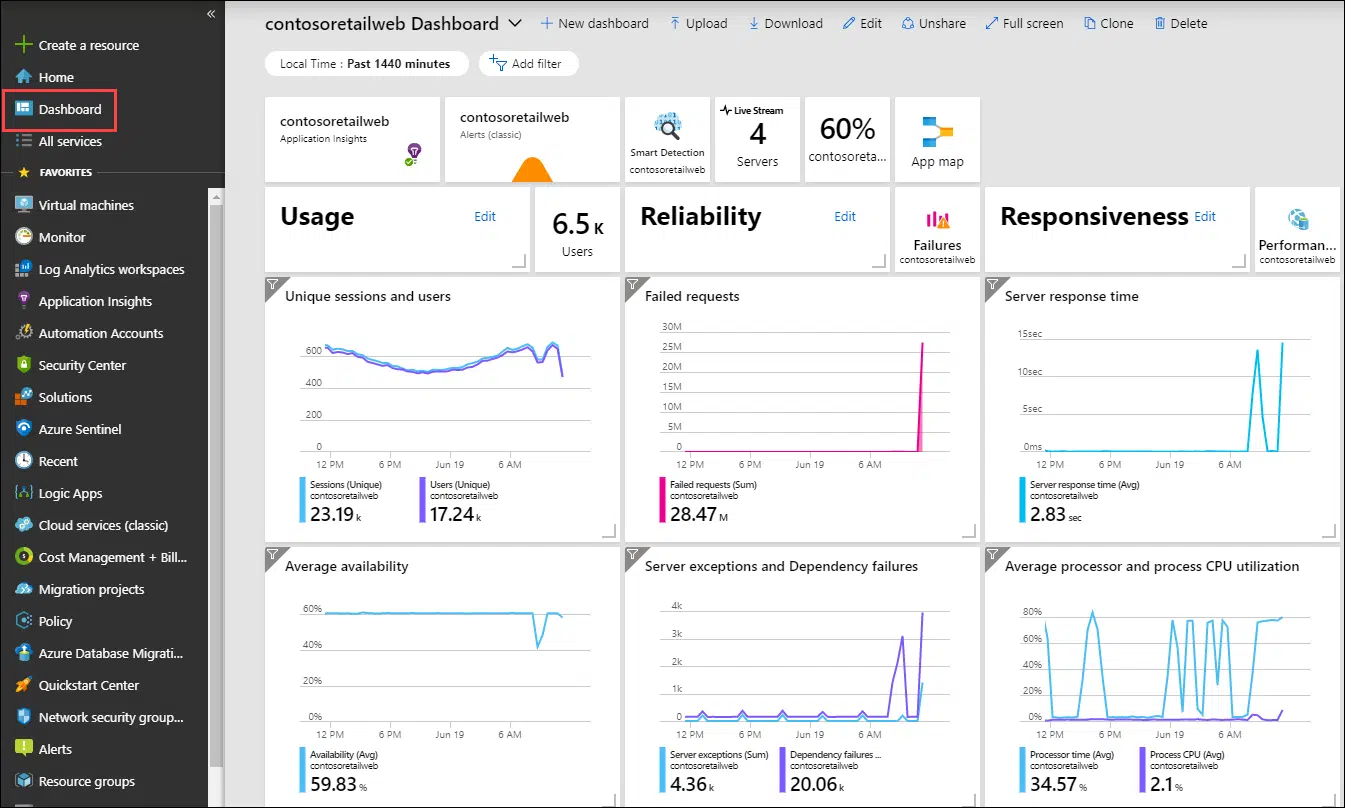
Collaboration with Azure DevOps
Azure DevOps provides developer services to support teams in planning work, collaborating on code development, and deploying applications.
For law firms investing in custom software development, such as client portals or internal tools, Azure DevOps can streamline the development process, fostering collaboration between in-house developers, external consultants, and legal professionals.
AI Integration with Azure Machine Learning
Azure Machine Learning is a service that allows users to build, train, and deploy machine learning models.
Law firms can leverage AI to automate routine tasks, such as document review or legal research. For example, a predictive model could be trained to identify and categorize relevant case law, streamlining the research process.
Secure File Sharing with Azure File Sync
Azure File Sync allows firms to centralize their files in Azure Files, while maintaining the compatibility and flexibility of an on-premises file server.
Securely share files with clients, co-counsel, or external consultants. For instance, during a multi-party litigation, all involved parties can access a centralized repository of shared documents, ensuring consistency and real-time collaboration.
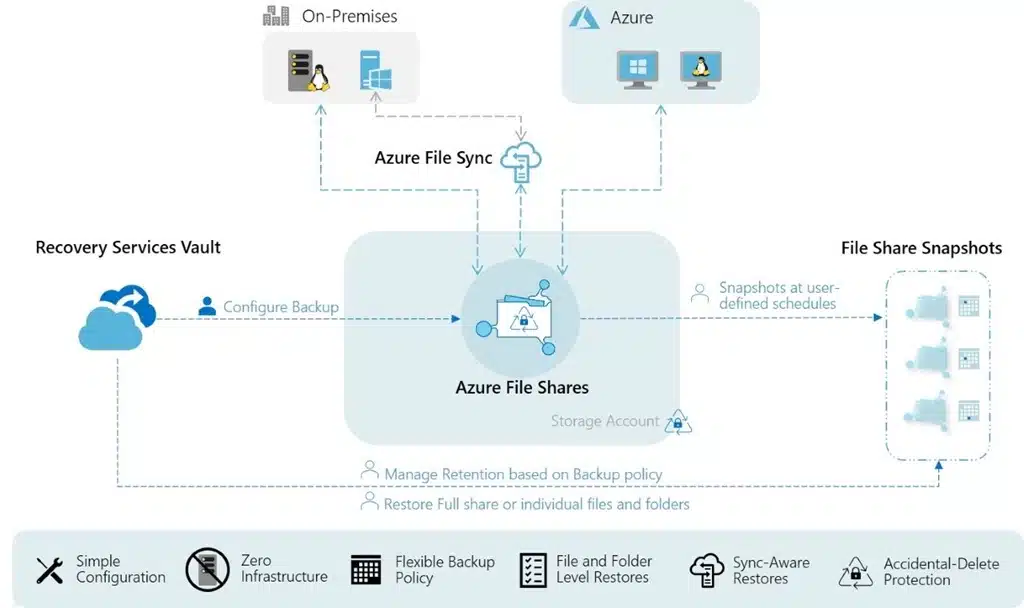
Compliance Assurance with Azure Policy
Azure Policy evaluates the resources in your environment to ensure compliance with organizational standards and best practices.
Given the stringent regulatory environment law firms operate in, Azure Policy can be used to ensure that all cloud operations adhere to industry-specific compliance requirements, such as data retention policies or client confidentiality standards.
Remote Work Enablement with Azure Virtual Desktop
Azure Virtual Desktop provides virtualized desktops and applications in the cloud, accessible from anywhere.
Use Azure Virtual Desktop to enable their attorneys and staff to access their work desktops, applications, and data from any location, ensuring continuity and productivity.
Related – Virtual Desktops for Law Firms: How they work, pros and cons, what software can be used in them, and use cases.
In essence, Azure’s potential for law firms extends beyond mere infrastructure and storage.
By strategically leveraging specific Azure services, law firms can not only modernize their operations but also gain a competitive edge, drive efficiency, and foster innovation in their legal practice.
Benefits of Using Azure for Law Firms
Scalability
Azure allows businesses to scale their resources up or down based on demand, ensuring cost-effectiveness and efficient resource utilization.
Compliance
Azure meets a broad set of international and industry-specific compliance standards, such as ISO 27001, HIPAA, and GDPR, ensuring that businesses can adhere to regulatory requirements.
Security
Microsoft invests heavily in security, ensuring that Azure adheres to strict security protocols. Features like Azure Security Center and Advanced Threat Protection provide robust defense mechanisms against potential threats.
Flexibility
With a wide range of services, Azure caters to various IT needs, from application development to data storage and management.
Integrated Development Environment
Azure seamlessly integrates with popular tools like Visual Studio, providing a comprehensive development environment.
Hybrid Capability
Azure offers hybrid solutions that allow businesses to integrate on-premises datacenters with the cloud, providing the best of both worlds.
Disaster Recovery
With features like Azure Site Recovery and Azure Backup, businesses can ensure business continuity and data recovery in the event of unforeseen disruptions.
Cost Management
Azure Cost Management provides tools that help businesses monitor cloud spending, optimize costs, and forecast future expenditures.
Serverless Computing
With Azure Functions, businesses can run event-driven code without having to manage the underlying infrastructure, leading to faster deployment and reduced costs.
Global Reach
Azure has data centers in multiple regions worldwide, ensuring that applications and services can be deployed closer to the user base, reducing latency.
Continuous Updates
Azure continuously rolls out updates, ensuring that businesses have access to the latest features, improvements, and security patches.
Azure offers a comprehensive set of benefits that cater to various business needs, from scalability and flexibility to security and global reach.
Drawbacks of Using Azure for Law Firms
Complexity
Azure offers a vast array of services and features that are not tailored for law firms, which can be overwhelming for new users or businesses without dedicated IT teams.
Cost Management
While Azure operates on a pay-as-you-go model, without proper monitoring and management, costs can escalate quickly, especially if resources are not de-provisioned. Azure's pricing can be convoluted. With so many services and pricing tiers, predicting monthly costs can be a nightmare, leading to unexpected bills.
Learning Curve
For those unfamiliar with cloud platforms, there can be a steep learning curve to understand and effectively utilize all of Azure's offerings. Azure's portal interface has been criticized for being non-intuitive and cluttered, making navigation and task execution cumbersome.
Performance Variability
Depending on the region and the specific Azure service, there can be performance inconsistencies, affecting the user experience.
Integration Challenges
While Azure is designed to integrate seamlessly with many tools and platforms, there can be challenges when trying to integrate with legacy systems or specific third-party applications.
Documentation
While Azure has extensive documentation, it can sometimes be dense, outdated, or lack practical examples, making it challenging for users to find the information they need.
Support Costs
Some users have reported that Azure's support can be slow or unhelpful unless you're on a high-tier support plan, which comes at a premium. So, while Azure does offer support, the higher tiers of support come with additional costs, which can add up for businesses requiring frequent assistance.
Transient Outages
Azure can experience outages, leading to potential downtimes that can impact business operations.
Security Misconfigurations
While Azure offers robust security features, it also relies on users to configure them correctly. Some of Azure's default configurations, especially around security, are not always set to best practices, leaving unsuspecting users potentially exposed. Misconfigurations can lead to potential security vulnerabilities or data breaches.
Over-Reliance on Windows
While Azure has expanded its support for various operating systems, there's still a perception of it being too Windows-centric, which can be off-putting for businesses or developers preferring Linux or other OS environments.
Resource Limitations
Azure imposes certain limits on resources, and while these are often more than sufficient for average users, large enterprises or specific applications might find these restrictive.
Alternatives to Azure — Comparing Cloud-Hosting Solutions
Uptime Practice
Uptime Practice is more than just a cloud-hosting solution; it’s a platform meticulously crafted for law firms. Recognizing the unique challenges and requirements of the legal industry, Uptime Practice ensures that legal software, data, and applications operate seamlessly and securely. Whether a firm is looking to move a single legal application to the cloud or seeking a comprehensive cloud platform for multiple applications, Uptime Practice offers tailored solutions.

STAND-OUT FEATURES
- Tailored for Legal Software: Uptime Practice shines in its ability to integrate flawlessly with leading legal software like Tabs3, ProLaw, PCLaw, and Time Matters.
- Holistic Cloud Solutions: From "Practice Go," designed for individual legal applications, to "Practice Foundation," a complete private cloud offering that includes software, documents, and Office access via a secure virtual desktop.
- Dedicated Legal-centric Support: Recognizing the nuances of the legal industry, Uptime Practice offers specialized support that understands the intricacies of legal operations.
- Robust Security Framework: With the sensitive nature of legal data in mind, Uptime Practice emphasizes top-tier security measures to guard against potential breaches.
PRICING
Uptime Practice offers different packages, such as “Practice Go” for individual legal applications and “Practice Foundation” for a complete private cloud experience. Specific pricing details would need to be obtained directly from Uptime Practice or through a consultation.

Google Cloud Platform (GCP)
GCP, Google’s foray into the cloud market, is known for its strong emphasis on data analytics, machine learning, and open-source integration. It offers a suite of tools that leverage Google’s vast infrastructure and expertise in data handling and analysis.
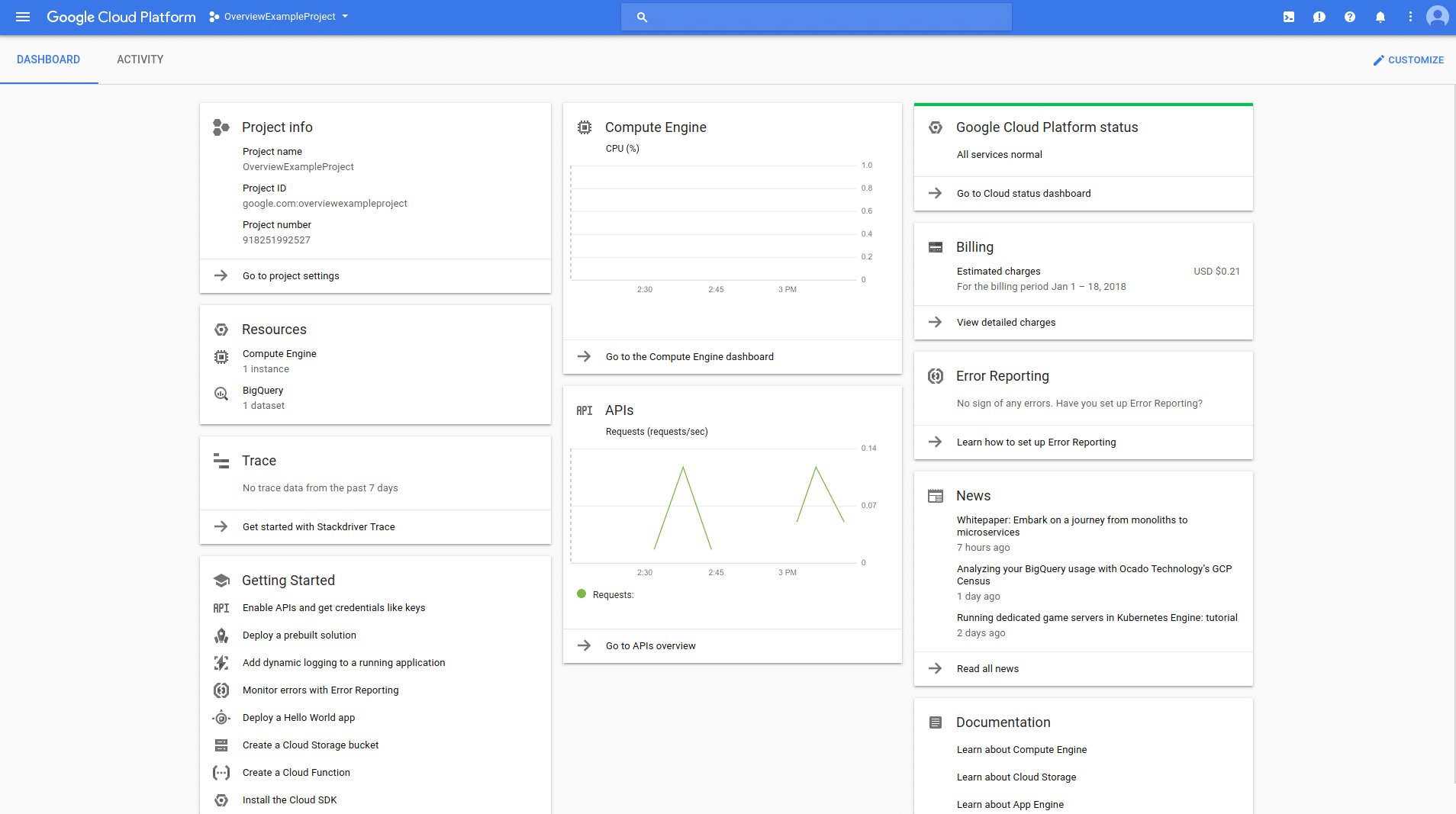
STAND-OUT FEATURES
- Data Tools: GCP offers tools designed for data storage, processing, and analysis.
- Machine Learning Services: GCP provides tools for machine learning and data-driven insights.
- Open Source Compatibility: GCP is designed to integrate with various open-source platforms.
PRICING
GCP’s pricing is competitive, often with incentives or credits for new users. Like others, it operates on a pay-as-you-go model.

Amazon Web Services (AWS)
AWS is Amazon’s contribution to the cloud computing space. It provides a wide range of services aimed at addressing diverse IT requirements. AWS’s infrastructure is global, aiming to provide consistent services across regions.
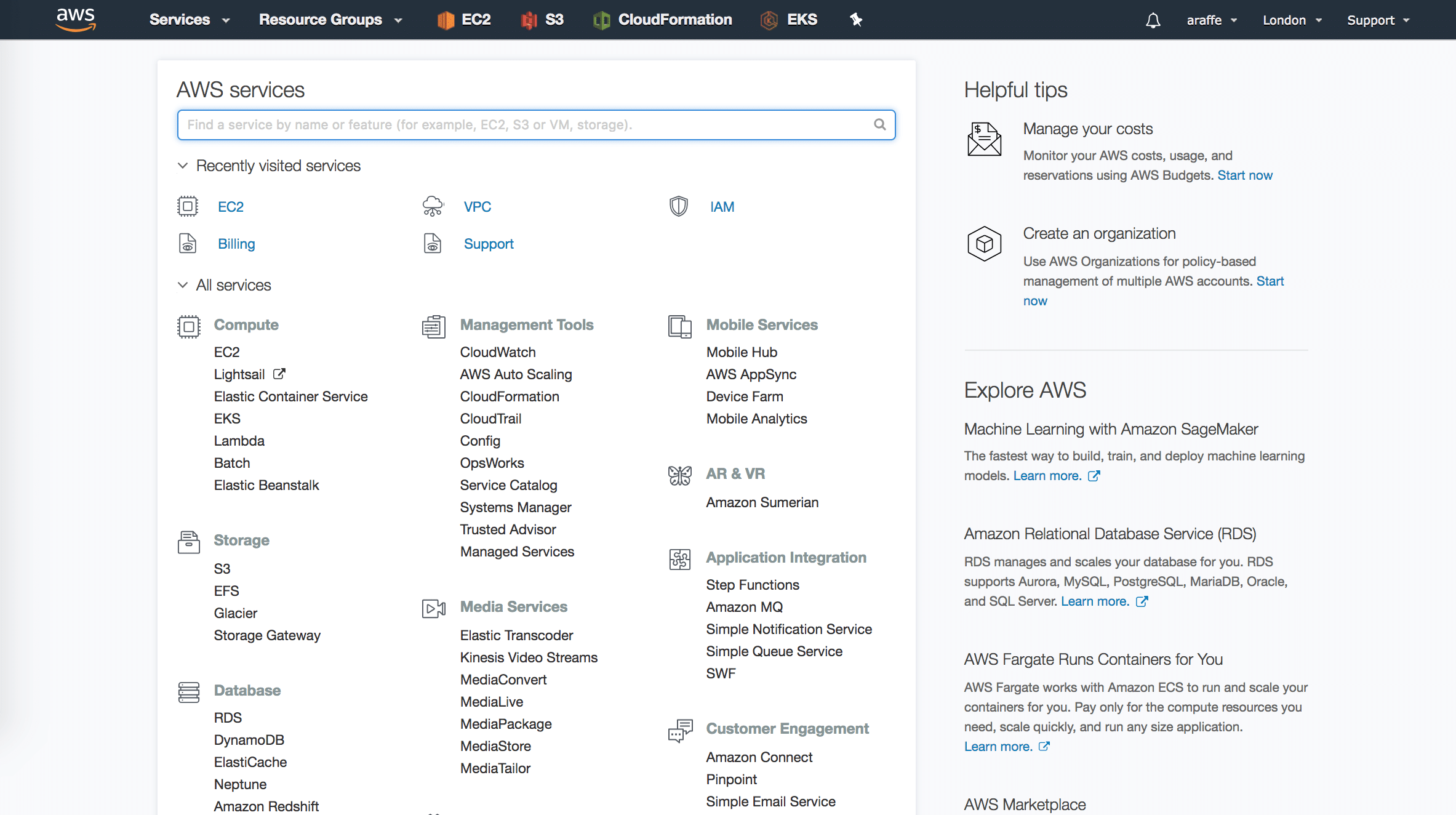
STAND-OUT FEATURES
- Service Variety: AWS offers a broad spectrum of services, catering to multiple IT needs.
- Modular Services: AWS's services are designed to be used in combination or standalone, based on business needs.
- Security Features: AWS provides various tools and protocols to enhance data security.
PRICING
AWS also operates on a pay-as-you-go model, with specific pricing varying based on the services utilized.

IBM Cloud
IBM Cloud offers a suite of cloud computing services, combining platform as a service (PaaS) with infrastructure as a service (IaaS). It also integrates well with Watson, IBM’s AI platform.
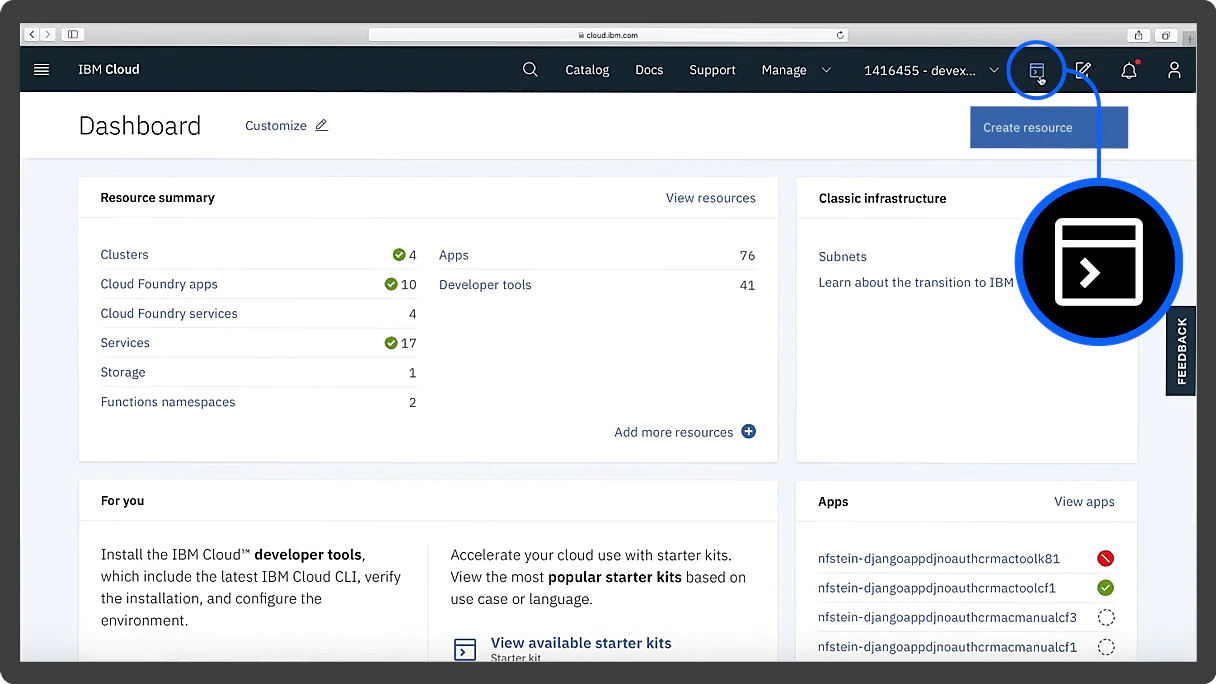
STAND-OUT FEATURES
- IBM Cloud Virtual Servers: Scalable compute capacity with virtual servers.
- Watson Studio: Tools for data scientists, application developers, and subject matter experts to collaboratively and easily work with data.
- Cloud Databases: Databases designed for modern web and mobile applications with scalable JSON and more.
PRICING
IBM Cloud offers a diverse pricing structure, including a free tier with a $200 credit for 30 days, flexible pay-as-you-go options, reserved instances for term commitments, and various custom payment plans such as loans and leasing.
Argument for a Private Cloud
Navigating the digital demands of modern law practices, private cloud solutions stand out as a beacon of efficiency and security.
Whether you choose Azure for your cloud-hosting, or a more legal-centric option, like Uptime Practice, the argument for a private cloud is extensive and valid.
Delving deeper, here are the pivotal reasons law firms should consider this technological shift:
Anywhere Access
Lawyers need to be agile. Private Clouds provide consistent access to work environments from any location, ensuring timely responses to urgent matters and meeting client needs.

Enhanced Security
Virtual Desktops safeguard sensitive data with features like encryption, multi-factor authentication, and regular audits, upholding the firm's reputation.
Cost-Efficiency
Virtual Desktops, being cloud-based, eliminate hefty investments tied to traditional IT setups. The savings can be channeled into other pivotal areas of the firm.
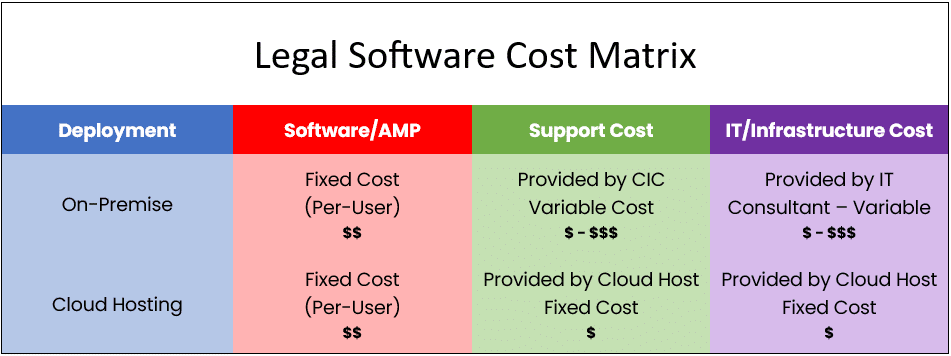
Reduced Burden of IT and Server Management
Shifting to Virtual Desktops means offloading computational demands from local servers to the cloud. This transition ensures optimal performance without the hassles of maintaining physical servers.
Plus, outsourcing routine IT tasks to a Cloud Service Provider lets the in-house team focus on strategic growth.
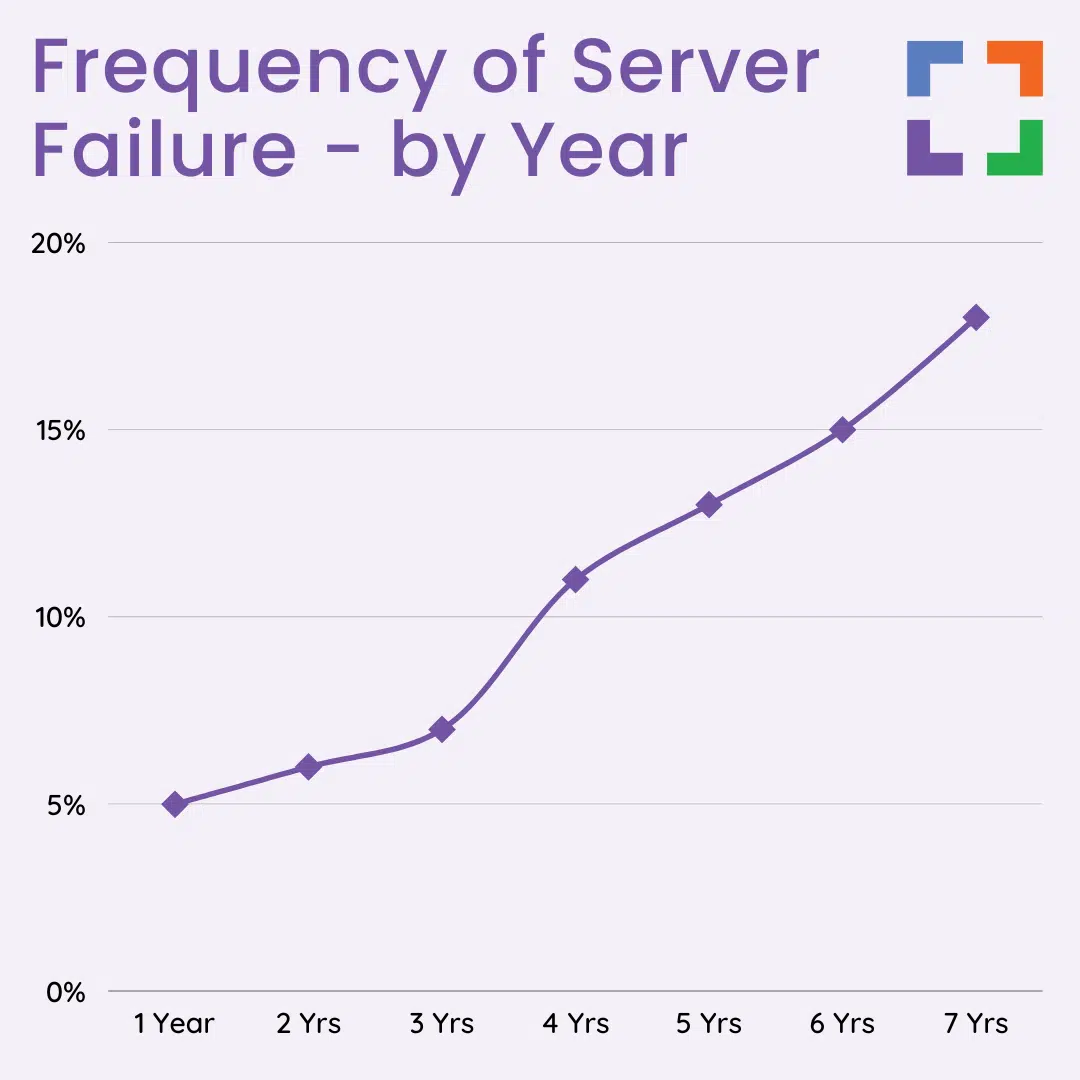
Predictable IT Budgeting
The subscription model of Virtual Desktops brings clarity to IT expenses. Firms can easily anticipate and plan their monthly or yearly IT budgets.
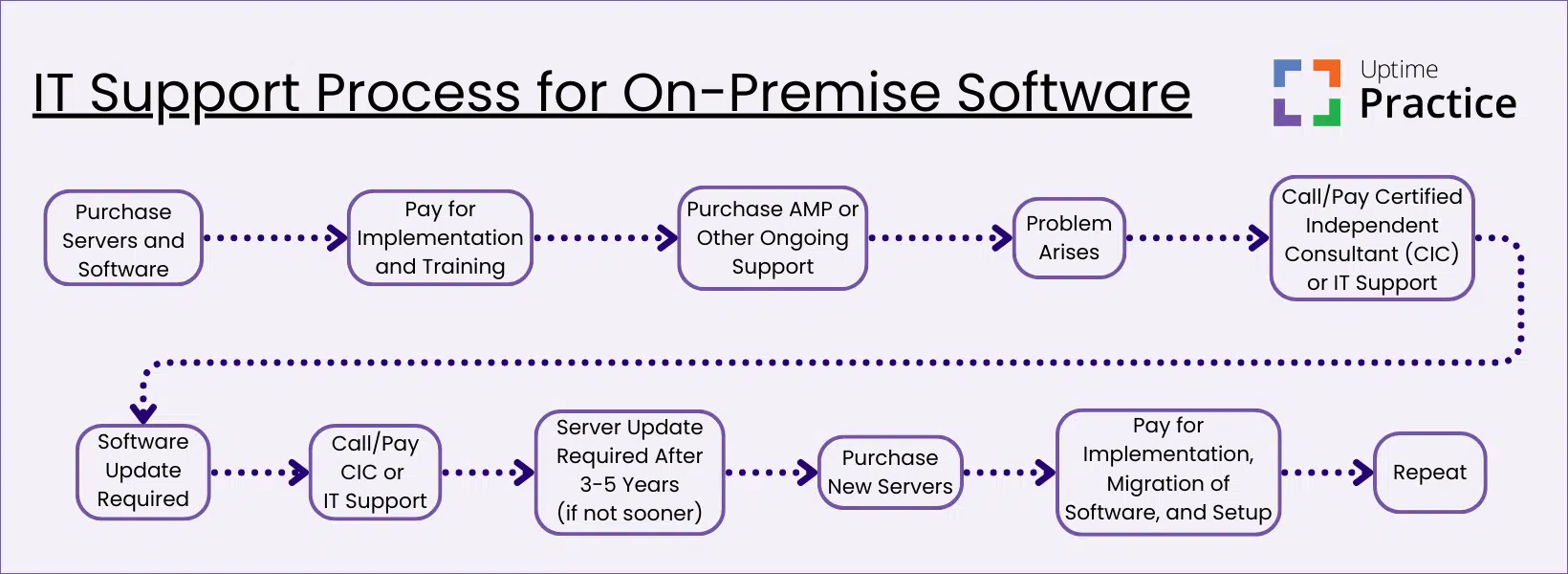
On the other hand, a cloud-hosted solution promises easier, more predictable IT support.
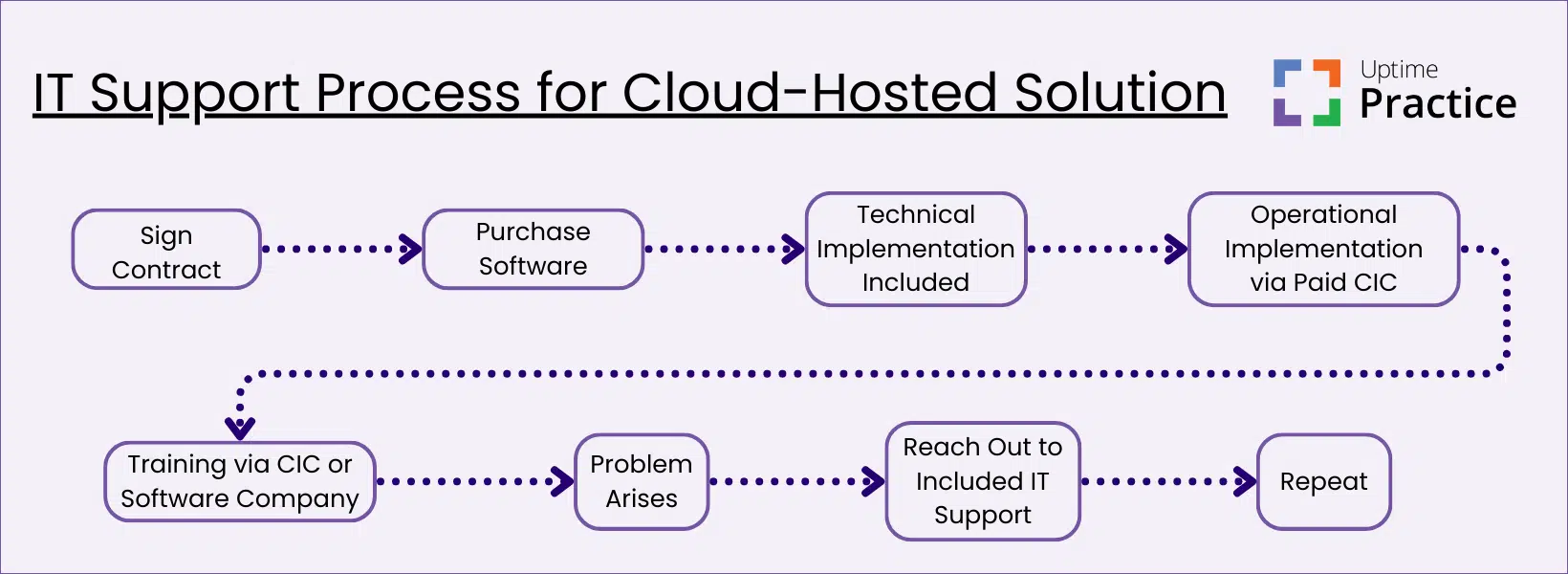
Enhanced Collaboration
Centralized data storage ensures consistent, updated information access for all team members. Virtual Desktops also promote real-time sharing and collaborative tools, fostering seamless team synergy.
Private Cloud Demonstrated
Most Virtual Desktop platforms look, work, and function like any other (Windows) desktop.

You have a desktop for shortcuts, apps, and files. You have a start menu, a Recycle Bin, and any other items or options that your firm may need. Most law firm Virtual Desktops will be standardized, with the apps and tools everyone in your firm needs, and can be additionally customized on a person-by-person basis.
By way of example, watch the demonstration video of Uptime Practice, our own cloud-based Virtual Desktop platform for law firms.
Related – Private Cloud 101 for Law Firms: Learn about the functions, costs, and reasons to utilize a private cloud.
Next Steps for Your Cloud-Hosting
Selecting the right cloud host is a pivotal step that influences your law firm’s efficiency and security. Start by pinpointing your firm’s needs, from software integrations to data volume and security standards.
As you explore options, you’ll find general platforms like Azure and specialized ones like Uptime Practice, which is crafted specifically for legal professionals.
Key considerations include the depth of support, with platforms like Uptime Practice offering tailored assistance, and the robustness of security measures.
Cost is also vital, but it’s essential to weigh the overall value, considering both efficiencies gained and potential challenges avoided. Before committing, test potential platforms and seek feedback from peers, especially those familiar with solutions like Uptime Practice.
Ultimately, choose a cloud host that aligns with both your current needs and future aspirations, ensuring a blend of tradition and modern efficiency.

Frequently Asked Questions - Azure for Law Firms
Azure offers law firms the flexibility to scale resources based on their needs, ensuring optimal performance during peak times. This means law firms can run their operations smoothly without worrying about IT infrastructure limitations.
Uptime Practice is tailored specifically for law firms, ensuring seamless integration with popular legal software like Tabs3, ProLaw, and PCLaw. While Azure provides a robust general-purpose cloud platform, Uptime Practice delivers an out-of-the-box solution optimized for legal operations.
Migrating to Azure can be straightforward, but it often requires careful planning to ensure data integrity and minimal downtime. Law firms might benefit from consulting with IT specialists during this transition.
Uptime Practice is designed with the unique needs of law firms in mind. Beyond just hosting, it offers specialized support, robust security measures tailored for sensitive legal data, and is optimized to work flawlessly with leading legal software, ensuring a smooth user experience.
Azure employs a multi-layered security approach, including advanced encryption, firewalls, and regular security audits. This ensures that sensitive legal documents and client data remain protected.
Uptime Practice offers a ready-to-use platform, eliminating the need for extensive setup and configuration. With its legal-centric support and emphasis on top-tier security, law firms can focus on their core operations without getting bogged down by IT concerns.
While Azure provides the infrastructure to host various applications, it’s not specifically optimized for legal software out of the box. However, with proper configuration and setup, law firms can run popular legal software on Azure.
Uptime Practice not only hosts but also maintains legal software, ensuring regular updates and optimal configurations. This proactive approach minimizes the risk of slow or disrupted user experiences, allowing law firms to operate efficiently.
While Azure is user-friendly, to fully leverage its capabilities and ensure optimal configuration for legal operations, it’s beneficial to have IT expertise, whether in-house or outsourced.
Uptime Practice:
The IT & Cloud Platform for Law Firms.
Uptime Practice is a suite of Managed IT and cloud services, made exclusively for law firms.
Practice Next
Technology + Legal Software Support for Modern Law Firms
Practice Next is a suite of Managed IT, Legal Software Support, and Cloud Essentials, made just for law firms.
-
Practice Next is a suite managed IT, technology essentials and legal software support.
-
Practice Next includes unlimited IT and legal software support, Microsoft 365, legal-centric cloud storage and more.
-
Practice Next pairs great with cloud-based legal software such as Clio Manage, CosmoLex, MyCase and more.
Practice Go
Cloudify Your Legal App
Does your law firm already have a cloud strategy, but have one premise-based application still running on onsite servers? Practice Go is for you.
- With Practice Go, we effectively turn your desktop/server- based legal software into a cloud application (a Published App), freeing your firm from the limitations of traditional software.
- Practice Go can cloudify your PCLaw, Time Matters, Tabs3, ProLaw, Juris, QuickBooks and more.
Practice Foundation
Complete Private Cloud for Law Firms
If your law firm needs a central, secure cloud platform for all of your legal software, documents and data, Practice Foundation is for you.
-
Practice Foundation is an end-to-end cloud platform that will host all of your firm's applications and documents, and will optionally include Office 365 + unlimited IT support. Everyone in your firm logs into a Virtual Desktop where they'll find all of their apps and docs.
-
Practice Foundation works with PCLaw, Time Matters, Tabs3, ProLaw, Juris, QuickBooks, Timeslips, TrialWorks, Adobe Acrobat and more.
Not Sure Which Edition You Need?
No problem. Check out our quick Comparison Chart for Uptime Practice, or Get in Touch to talk with our sales team.

Dennis Dimka
As the founder and CEO of Uptime Legal Systems, I've had the privilege of guiding our company to become a leading provider of technology services for law firms.
Our growth, both organic and through strategic acquisitions, has enabled us to offer a diverse range of services, tailored to the evolving needs of the legal industry.
Being recognized as an Ernst & Young Entrepreneur of the Year Finalist and seeing Uptime Legal ranked among the Inc. 5000 list of fastest-growing private companies in America for eight consecutive years are testaments to our team's dedication.
At Uptime Legal, we strive to continuously innovate and adapt in the rapidly evolving legal tech landscape, ensuring that law firms have access to the most advanced and reliable technology solutions.
Related Posts
April 1, 2024
The Financial Case for Cloud for Law Firms
March 13, 2024
Law Firm Collaboration Software
March 8, 2024
25 Things To Ask Your Legal Private Cloud Provider
March 5, 2024
How to Use ProLaw in the Cloud in 2024
January 9, 2024
VoIP for Law Firms
January 8, 2024
How to Use Orion Legal Software in the Cloud in 2024
January 8, 2024
How to Use Time Matters in the Cloud in 2024
January 8, 2024
How to Use Juris in the Cloud in 2024
January 8, 2024
How to Use Tabs3 in the Cloud in 2024
January 8, 2024
How to Use TrialWorks in the Cloud
January 8, 2024
How to Use PCLaw in the Cloud in 2024
January 8, 2024
How to Use Timeslips & QuickBooks in the Cloud in 2024
December 15, 2023
ProLaw: Complete Review, Features, Pricing
December 15, 2023
Juris: Complete Review, Features, Pricing
December 15, 2023
PCLaw: Complete Review, Features, Pricing
December 15, 2023
7 Reasons Your Law Firm Should Consider Clio Manage
December 15, 2023
How to Use Worldox in the Cloud in 2023
December 15, 2023
7 Reasons Your Law Firm Should Consider Tabs3
December 15, 2023
LEAP: Complete Review, Features, Pricing
December 15, 2023
Tabs3 & PracticeMaster: Complete Review, Features, Pricing
December 15, 2023
QuickBooks for Law Firms: Complete Review, Features, Pricing
December 15, 2023
ProLaw Workspace – Review & Guide for Law Firms
December 15, 2023
Time Matters: Complete Review, Features, Pricing
December 15, 2023
TrialWorks – An Uptime Legal Review
December 15, 2023
Cybersecurity for Law Firms
December 8, 2023
Managed Cloud Services for Law firms
November 1, 2023
Clio Review: Details, Features, Pricing
October 24, 2023
AWS for Law Firms: A Complete 101
September 28, 2023
Best Law Practice Management Software (2024)
September 5, 2023
Juris Support – How to Get Help for Juris
August 30, 2023
Tabs3 Support – How to Get Help for Tabs3
August 30, 2023
Microsoft Teams for Law Firms
August 23, 2023
ProLaw Support – How to Get Help for ProLaw
July 24, 2023
PCLaw Support – How to Get Help for PCLaw
July 20, 2023
Private Cloud 101 for Law Firms
December 8, 2021
Key Trends from the 2021 Legal Trends Report
February 24, 2021
Uptime Legal Joins the Thomson Reuters Marketplace
November 18, 2019
Best Legal Practice Management Software for 2021
September 16, 2019
The Financial Case for Cloud for Law Firms
June 17, 2019
Law Firm IT – What Are Your Options?
January 28, 2019
PCLaw® Go – An Uptime Legal Review
January 7, 2019
Time Matters® Go – An Uptime Legal Review
October 24, 2017

